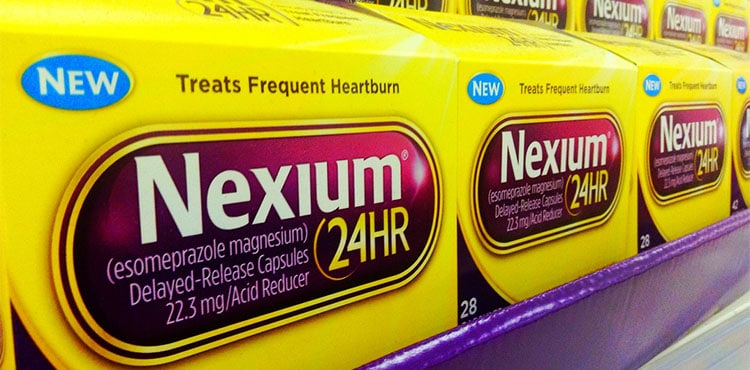
A Colorado Nexium Lawsuit may be an option for patients who suffered complications after taking the heartburn medication. Millions of Americans use prescription medications such as Nexium to treat gastroesophageal reflux disease (GERD) and ulcers. However, Nexium has been linked to severe side effects such as an increased in risk of acute interstitial nephritis, chronic kidney disease, and kidney failure. Affected patients and their families may be eligible to file a lawsuit and recover compensation for their injuries with the help of a Colorado Nexium lawsuit attorney.
For more information, contact Attorney Group for Colorado. We offer free, confidential, no obligation consultations. We can help answer your questions, and if you choose to pursue a case we can connect you with an affiliated Nexium lawsuit attorney who can assist you throughout the legal process.
What is Nexium and How Does It Work?
Nexium, also known as esomeprazole, is a prescription medication used to treat symptoms related to gastroesophageal reflux disease (GERD), or acid reflux disease. Nexium may also be used to relieve symptoms associated with heartburn and conditions such as Zollinger-Ellison syndrome.
Nexium, along with other drugs such as Prilosec and Prevacid, belongs to a group of medications known as proton pump inhibitors (PPI). PPIs work by decreasing the amount of acid produced in the stomach.
Nexium and Acute Interstitial Nephritis
Acute Interstitial Nephritis (AIN) is a condition in which the areas between the kidney tubules become inflamed or swollen. Symptoms of AIN include increased or decreased urine production, blood in the urine, fever, confusion, exhaustion, nausea, vomiting, and elevated blood pressure. AIN is most commonly caused by an allergic reaction due to medications, including PPIs. Severe cases of AIN may result in kidney failure, requiring kidney dialysis or kidney transplant.
According to an article in the medical journal BMC Nephrology, a number of biopsy-confirmed case reports have been published suggesting a connection between the use of PPIs such as Nexium and AIN, including research published in 2006, which cited three cases of esomeprazole-associated AIN.
Nexium and Chronic Kidney Disease
According to the National Kidney Foundation (NKF), chronic kidney disease (CKD) includes conditions that damage the kidneys and decrease their ability to maintain the health of the patient. If left untreated, CKD may lead to kidney failure.
According to articles cited by CBSNews.com, PPIs such as Nexium may increase the risk for CKD. A study conducted between 1996 and 2011 compared those who used PPIs with nonusers and those who used Histamine-2 (H2) blockers to treat acid reflux. Results of the study noted that the use of PPIs, including Nexium, was independently associated with a 20 to 50 percent higher risk of CKD.
Nexium Side Effects
Common side effects of Nexium include:
- Drowsiness
- Dry mouth
- Constipation
- Abdominal pain
- Headache
- Diarrhea
- Nausea
- Gas
Other serious side effects may occur when using Nexium. Those side effects include:
- Hip, wrist, and spine fracture
- Vitamin B-12 deficiency
- Chronic inflammation of the stomach lining
- Low magnesium levels
Other Nexium Risks
In addition to AIN and CKD, PPIs such as Nexium have been linked to other serious complications relating to the kidneys such as acute kidney injury (AKI) and renal failure. If left untreated, these conditions, which may occur suddenly or over a long period of time, may lead to kidney dialysis or kidney transplant.
Nexium Lawsuit
An Illinois Nexium lawsuit alleges that the maker of the drug, AstraZeneca, knew or should have known about the possible risks of CKD and the use of Nexium. Likewise, the lawsuit alleges that, even when the drug is taken as directed, the manufacturers failed to adequately warn against the negative effects and risks associated with Nexium, including an increased risk of CKD.
The lawsuit further claims that, despite hundreds of reports of injury have been submitted to the U.S. Food and Drug Administration (FDA) in association with Nexium and other PPIs, AstraZeneca took no action to inform the plaintiff or the plaintiff’s physician of the risk of kidney injuries.
How a Colorado Nexium Lawsuit Can Help

Drug makers have a duty to provide safe products. If there are risks of harm associated with their products, they also must provide adequate warnings. If a drug maker fails to fulfill this duty, it could be held liable in lawsuits for injuries that may result.
People injured by bad drugs may be eligible to recover money for:
- Medical Expenses
- Lost Wages
- Pain and Suffering
The families of those who have died may be eligible to recover money for funeral expenses and the pain that comes with losing a loved one.
For more information, contact Attorney Group for Colorado. After you contact us, an attorney will follow up to answer questions that you might have. There is no cost or obligation to speak with us, and any information you provide will be kept confidential.
Please note that the law limits the time you have to pursue a claim or file a lawsuit for an injury. If you think you have a case, you should not delay taking action.





